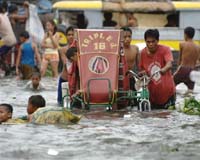Let's imagine the entire world waking up one day to discover Filipinos have disappeared. I'm talking here about the six or seven million Filipinos currently working overseas in countries with names that run the entire alphabet, from Angola to Zimbabwe .
Let's not worry first about why or how the Filipinos disappeared; in fact, it becomes academic whether it's a day or a week. Just imagine a world without Filipinos.
Think of the homes that are dependent on Filipino housekeepers, nannies, caregivers. The homes would be chaotic as kids cry out for their nannies. Arabs, Hong Kong and Singaporean and Taiwanese yuppie couples are now forced to stay home and realizing, goodness, there's so much of housework that has to be handled and how demanding their kids can be and hey, what's this strange language they're babbling in?
It's not just the children that are affected. The problems are even more serious with the elderly in homes and nursing institutions, because Filipino caregivers have provided so much of the critical services they need. When temporary contractual workers are brought in from among non-Filipinos, the elderly complain. They want their Filipino caregivers back because they have that special touch, that extra patience and willingness to stay an hour more when needed.
Hospitals, too, are adversely affected because so many of the disappeared Filipinos were physicians, nurses and other health professionals. All appointments for rehabilitation services, from children with speech problems to stroke survivors, are indefinitely postponed because of disappeared speech pathologists, occupational and physical therapists!
Eventually, the hospital administrators announce they won't take in any more patients unless the conditions are serious. Patients are told to follow their doctors' written orders and, if they have questions, to seek advice on several Internet medical sites. But within two days, the hospitals are swamped with new complaints. The web sites aren't working because of missing Filipino web designers and web site managers.
Service establishments throughout the world -- restaurants, supermarkets, hotels -- all close down because of their missing key staff involved in management and maintenance. In Asia , hotels complain about the missing bands and singers.
In the United States , many commercial establishments have to close shop, not just because of the missing Filipino sales staff but because their suppliers have all been sending in notices about delays in shipments. Yup, the shipping industry has gone into a crisis because of missing Filipino seafarers.
The shipping firms begin to look into the emergency recruitment of non-Filipino seafarers but then declare another crisis: They're running out of supplies of oil for their ships because the Middle Eastern countries have come to a standstill without their Filipino workers, including quite a few working for the oil industry.
Frantic presidents and prime ministers call on the United Nations to convene a special session of the Security Council but Ban Ki-Moon says he can't do that because the UN system itself is on the edge, with so many of their secretarial and clerical staff, as well as translators, having disappeared from their main headquarters in New York and Geneva, as well as their regional offices throughout the world. Quite a number of UN services, especially refugee camps, are also in danger of closing down because of missing Filipino health professionals and teachers.
Ban Ki-Moon also explains that he can't convene UN meetings because the airports in New York , Washington and other major US cities have been shut down. The reason? The disappeared Filipinos included quite a few airport security personnel who used to check passengers and their baggage.
Ban Ki-Moon calls on the World Bank and international private foundations for assistance but they're crippled, too, because their Filipino consultants and staff are nowhere to be seen. Funds can't be remitted and projects can't run without the technical assistance provided for by Filipinos.
An exasperated Ban Ki-Moon calls on religious leaders to pray, and pray hard. But when he phones the Pope, he is told the Catholic Church, too, is in crisis because the disappeared include the many Filipino priests and nuns in Rome who help run day-to-day activities, as well as missionaries in the front lines of remote posts, often the only ones providing basic social services.
As they converse, Ban Ki-Moon and the Pope agree on one thing: the world has become a quieter place since the Filipinos disappeared. It isn't just the silencing of work and office equipment formerly handled by Filipinos; no, it seems there's much less laughter now that the Filipinos aren't around, both the laughter of the Filipinos and those they served.








 It seemed like there was no other option but to go home and just spend the afternoon sleeping. We got in at around 6pm and started to make sotanghon for dinner. A few minutes later, I got an sms from Joseph, the manager of Volume which read:
It seemed like there was no other option but to go home and just spend the afternoon sleeping. We got in at around 6pm and started to make sotanghon for dinner. A few minutes later, I got an sms from Joseph, the manager of Volume which read: 
 My french ex-boyfriend witnessed this once and he said nothing but:
My french ex-boyfriend witnessed this once and he said nothing but: 





